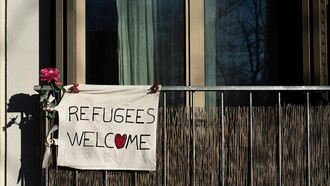There were birds, and the Turkish national anthem blared every Monday, and every day too. The light in the bedroom was still on, with its upper window open, offering a view of every rooftop in the vicinity. Whenever it rained all night, the sky would be cloudy, and rainwater would collect on each triangular roof. And again, I would wake up, my heart pounding. The birds, the national anthem, the saxophone, and the room's light, against a backdrop of gloomy, foggy skies.
After my Turkish language club event, I would head to the English club every Thursday at the Cultural Club with my classmate, where I met different people. We would discuss a structured topic of the day, pose questions, engage in group discussions, have tea, and then proceed to Turkish tea shops for coffee and more socialising over snacks — I usually opted for spicy potato chips. By eleven, I would usually head home. Thursday was my night to socialize and connect with people. I would return, close my door, and go to sleep.
But sleep often eluded me, so I would move to the sofa or the balcony rooftop, gazing at the city's skyscraper lights after a panic attack. The breeze was too cold to be gentle, surrounded by towering buildings, pondering things I needed to stop thinking about. Half of the view consisted of neighborhood hills and a distinctive building visible from afar. The other half was dominated by skyscrapers, one adorned with the Turkish red flag, visible from any angle of the apartment. It was a bittersweet sadness that enveloped me in bed. I thought I understood the feeling, but I refrained from delving deeper.
I had been experiencing frequent panic attacks every Thursday or Friday night, without understanding why. I had achieved what I wanted, so why wasn't I happy? I couldn't grasp it. I felt like I was exerting extra effort to smile, without truly contemplating it. Melancholy is a peculiar form of depression — one that you oddly cherish, mistaking it for action rather than inaction. Suddenly, I would find myself breathing heavily, my reality shattered, heart racing alongside adrenaline, feeling as though someone had hurled my world from the sky, the abyss deafening within.
But that sensation struck a chord in my heart when I was unexpectedly deported from the country itself, for no discernible reason, just as I was transitioning to a new phase in life, applying for jobs where relationships were not a priority. I feared I would continue making poor choices and meeting incompatible people by fate, prompting me to make a decision. Marriage wasn't my next step; adopting a child was.
On my way back from the interview, as I strolled through the hilly streets lined with random buildings on Istanbul's European side, I received a call from the agent who had arranged my immigration office appointment, informing me out of the blue that I was being deported. Not only was my application denied, but I was also being deported. I demanded a reason, but received none. I asked around, including a lawyer I had met at the English club. They had no right to do this. Firstly, I was a student; secondly, no reason was provided. I remember crying on the bus. I couldn't help it, and everyone glanced at me, judging me, but there was nothing I could do. It felt like I was confronting something invisible, yet invincible — a struggle with the country or something hidden. I couldn't quite identify the emotions swirling within me; I was lost, completely lost.
On the final day, there were no birds singing, no national anthem declaring "Korkma!" Yet, the high-pitched note of this word still jolted me awake from my slumber. This time, I slept on the living room sofa, facing the painting I thought I would leave behind in the house until my last day. No one was certain of my identity or my origins — not even me! The only meaningful conversation I had was with the elderly owner of the house, an octogenarian or nonagenarian, with his wife who would bicker during Ramadan daylight. He spoke fluent German. I would often sit near the building's small stairs, chatting and listening to him — a conversation where he would speak to me in German about my life, my well-being, my origins, and more. Despite only knowing up to basic German from my time in Morocco, where I had originally intended to study in Germany but ended up elsewhere, we managed to communicate awkwardly.
Over time, I became fluent in Turkish without my teacher's validation — perhaps due to frequent mistakes or a lack of confidence in showing off my skills to others. Initially, I would respond to his conversations in German, switching to Turkish later on when I realized he didn't understand Turkish well. It was a strange situation — once fluent in German, I began losing my ability to speak it fluently as my Turkish improved, yet he understood my predicament. Ironically, despite suffering from Alzheimer's, he was the only person who remembered my true origins when others doubted I was from Morocco, leading me to contemplate my identity extensively — how it differed from the truth and the perception of who I was to others.
It was a complex situation where even my choice of attire influenced others' perceptions of me, influencing whether they would accept or tolerate me. Initially, it began as a socio-psychological experiment, but little did I know, the only time I truly felt like myself was at home. Though I'm not sure if that's truly "being myself," it plunged me into a melancholic state and constant panic attacks, every Thursday or Friday, triggered by my own brain when confronted with social anxiety, often causing me to act contrary to my feelings.
So, I left without fully comprehending that feeling, but through tear-filled, foggy eyes, all I could see was the lights of Istanbul, echoing loudly as I arrived at Casablanca Airport at 2 a.m.
"Here we go again!"














